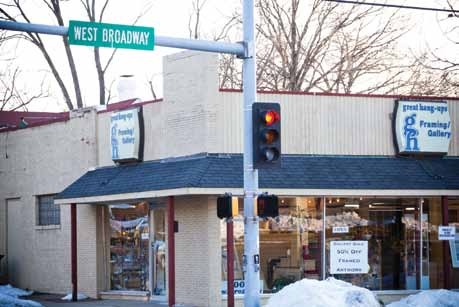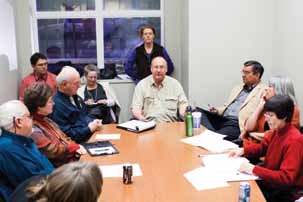Dudley seeks Great Hangups compromise
Councilman hosts mediation with neighbors, property owners
Four months after the City Council rejected a plan to formally commercialize the corner of Broadway and West Boulevard, the contentious Great Hangups rezoning is back.
The framing store was allowed to operate on the corner of a residential area for years, and Patra Mierzwa and Mark Nichols asked the city in 2009 to rezone their land and three adjacent houses from residential to commercial.
But the proposal got hung up for more than a year in city hearings and negotiations with neighborhood associations and finally garnered a 5-2 “no” vote from the City Council in early October despite a unanimous favorable recommendation from the Planning and Zoning Commission. Vigorous opposition from the neighbors ultimately sank the proposal to change the zoning to planned commercial, which the owners said would help them sell the property. (The framing store is a “non-conforming use,” grandfathered into the city’s zoning code.)
The Great Hangups case highlighted the difficulties property owners face when trying to rezone land near established neighborhoods with active neighborhood associations. Although city planners and policymakers often signal support for infill development, neighbors are often wary of any change in land use that might overburden infrastructure and change the character of the area.
But last Monday, all the players in the Great Hangups rezoning request gathered in a standing-room-only City Hall conference room to rehash the fate of the most controversial corner in Columbia.
The meeting, organized by 4th Ward Councilman Daryl Dudley, is likely the first of many designed to get neighbors and property owners to craft a compromise on the corner. Dudley’s ward contains the property, and he voted against the rezoning in October. Since then, he has received numerous calls from the property owners asking him to reconsider. He has met with concerned neighborhood associations and decided to organize the mediation, he said.
“Right now we’re just in a lets-get-things-out-in-front-where-we-can-see-them-and-talk-about-it phase,” Dudley said.

Dudley said neighbors understand the rezoning would come back at some point, and neither side will be happy “until we get something done.” He would not say whether he planned to introduce a motion for the Council to reconsider the request.
“I could go either way with it,” Dudley said. “I just want to get everyone on the same page.”
When the Council votes down a rezoning request, the property owner must wait a year before submitting the same request. A Council-initiated resubmittal of a rezoning is rare, Teddy said.
“We have not done this procedure during my time here,” said Teddy, who was hired in 2005.
The meeting Feb. 14 drew Dudley, Teddy, Brodsky, 3rd Ward Councilman Gary Kespohl and 6th Ward Councilwoman Barbara Hoppe, as well as the property owners and about 10 neighbors.
The dialogue between the two sides covered many of the same issues already aired at the P&Z and Council hearings. One of the issues intensely discussed during the October Council meeting was insufficient infrastructure in the area, particularly sewer. Residents in the older sections of Columbia have been raising a stink recently about inadequate sewers, and those near Broadway and West Boulevard worry that commercial development will exacerbate their many sewer backups.
Many of those homes are served by a private common collector, Teddy said in an interview. Rather than attaching each home individually to a city sewer main, a commonly owned private line connects the homes before connecting to the city sewer. That type of arrangement is illegal now, Teddy said, and the city has a policy to replace the private connectors. But there are so many that the city struggles to keep up with replacements, he said.
The planned commercial zoning requested for the site means that any development plans would have to be vetted by the city. Conceivably, infrastructure improvements could be required in a development agreement. The owners, though, said they have no intention of developing the site; they just want the initial zoning so they can better market it.
“This is a common phenomenon,” Teddy said. “People who aren’t satisfied with their existing services, the zoning hearing can become an occasion to highlight those issues.”
Neighbors have also opposed the proposal because it lacks a development plan. Nichols said that would be the responsibility of whoever buys his property.
“I’m not going to spend money on an architectural drawing that I have no intention of building,” he said.

Hagan said it wouldn’t be right for the Council to take another vote on the proposal before the owners and neighbors reach an agreement on the property’s future.
“We believe to go back to the Council with this would undermine the purpose of a neighborhood association,” she said.
Hagan read off a list of building restrictions her neighborhood association wants as part of a rezoning, such as light-pole height, a restriction on variances and details as minute as a hardwood fence and opaque bushes dividing the property from the neighborhood.
Nichols said he has included many of the requested restrictions in his statement of intent, but too many would preclude him from selling the property. His property rights are being abused, and he is being “victimized,” he said.
“We’ve reached the point where we didn’t feel we couldn’t make any more restrictions and still have the property be marketable,” Nichols said.
If the city had a form-based zoning code, neighbors would already know what to expect from a development, Hagan said. She suggested forming an overlay district for the area and developing form-based codes for it. “This is such an opportunity,” she said.
“It is but not at our expense,” Nichols retorted.
Teddy and Brodsky indicated that developing form-based codes, even for just a small area, would take months at least. Teddy signaled he was wary of revamping codes because of one zoning request.
Although the back-and-forth was tense at times, the two parties seemed willing to work toward a compromise. They hope to meet again in March.
Asked afterward whether she was committed to the idea of forming an overlay district, Hagan said a protective, “out-of-the-ordinary” statement of intent that protects the neighborhood’s character and quality of life would be acceptable. “Then I think we would already have broken new ground.”


